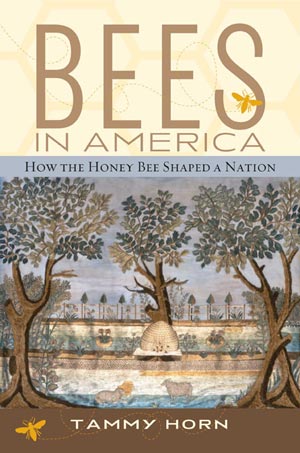
Bees in America
 Our movie-star neighbor lent me a copy of Bees in America: How the Honey Bee Shaped a Nation,
by Tammy Horn, which turned out to be an interesting, if dense,
read. I'll start with the negatives, as usual. Bees in
America is put out by a University Press, which often means the text is
more scholarly than will be appealing to a layman audience. Horn's
book definitely pushes some of those "required reading" buttons, with
more primary citation and repetition than is fun for non-historians to
read.
Our movie-star neighbor lent me a copy of Bees in America: How the Honey Bee Shaped a Nation,
by Tammy Horn, which turned out to be an interesting, if dense,
read. I'll start with the negatives, as usual. Bees in
America is put out by a University Press, which often means the text is
more scholarly than will be appealing to a layman audience. Horn's
book definitely pushes some of those "required reading" buttons, with
more primary citation and repetition than is fun for non-historians to
read.
On the other hand, if
you're willing to do a bit of slogging and skimming, you'll find real
gems within these pages. The rest of this week's lunchtime series
will offer some insight into the history of beekeeping in America, so
here I'll just mention a couple of tidbits that didn't fit anywhere
else. Did you know that bees have been used as political and
social metaphors for centuries, being used to teach that labor is a
virtue and that the lower class is disposable in seventeenth century
England? And how about tanging, that tradition of banging pans or
drums or ringing bells when swarms pass overhead --- did you realize
tanging was originally meant to mark ownership of the swarm, not to make
the bees land in your yard? Stay tuned for other bee tidbits in
later posts.
| This post is part of our Bees in America lunchtime series.
Read all of the entries: |
Want more in-depth information? Browse through our books.
Or explore more posts by date or by subject.
About us: Anna Hess and Mark Hamilton spent over a decade living self-sufficiently in the mountains of Virginia before moving north to start over from scratch in the foothills of Ohio. They've experimented with permaculture, no-till gardening, trailersteading, home-based microbusinesses and much more, writing about their adventures in both blogs and books.
Want to be notified when new comments are posted on this page? Click on the RSS button after you add a comment to subscribe to the comment feed, or simply check the box beside "email replies to me" while writing your comment.

Thank you so much for your article on beekeeping. As a beekeeper of more than 30 years, my husband was thrilled to find your site. He immediately forwarded it to me knowing I would enjoy your writing. "The problem with the bees" has become one of our most repeated conversations. Few people realize that it is no exaggeration to say that a full third of the supermarkets would disappear if it were not for nature's most efficient communities. The very fact that there were approximately 13,000 commercial beekeepers in the in the mid-90's and that number had decreased to about 1,200 a decade later, in itself tells a story. Again thank you for your wonderful articles. We have a beekeeping friend to whom I can hardly wait to pass on your website with it's articles on chickens...also his passion. Keep up the wonderful work. It is sites like yours that make the web a wonderful, educational tool.